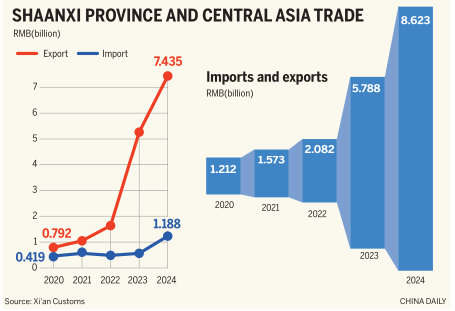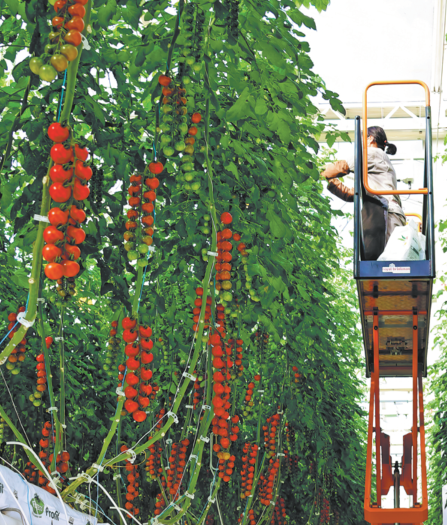Agricultural base in Shaanxi province helps SCO member states increase yields, boost development of key sector

Quality seeds suitable for local environments in Shanghai Cooperation Organization member countries are being developed at the SCO agricultural base in Yangling Demonstration Zone in Shaanxi province, as part of efforts to help maintain food security and boost modern agricultural progress.
On June 14, 2019, President Xi Jinping said at the 19th meeting of the Council of Heads of State of the Shanghai Cooperation Organization in Bishkek, Kyrgyzstan, that China would be happy to set up an SCO demonstration base in Shaanxi province for exchange and training on agricultural technologies to strengthen cooperation on modern agriculture with other countries in the region.
Over the past six years, fruitful results have been achieved in agricultural technology cooperation, talent training and cross-border trade.
Food security challenge
The base has cultivated more than 300 crop varieties such as rapeseed, wheat and corn that are widely used domestically. More than 150 of them have been introduced to the fields of countries involved in the Belt and Road Initiative, data from local authorities showed.
READ MORE: 'Shanghai Spirit' should be advanced with new vitality
“These varieties undergo rigorous adaptability trials and demonstrate excellent performance in disease resistance, yield and quality,” said Ji Wanquan, a wheat breeding expert at Northwest A&F University in Yangling.
For example, the wheat varieties promoted in Kazakhstan are well suited to the local climate, which is cold and dry, and these have effectively alleviated local grain supply pressures, Ji said.
Due to insufficient disease resistance and the lodging resistance of wheat, it has been difficult to increase the local yield. Professor Zhang Zhengmao’s team, also from the university, conducted breeding and adaptability selection in Yangling, as well as Gansu province and the Xinjiang Uygur autonomous region, to create about 120 highquality wheat lines for Kazakhstan.

The varieties trialled at the China-Kazakhstan agricultural technology demonstration park in Kazakhstan can achieve up to 60 percent higher yields compared to local varieties, Zhang said, adding that the team is preparing to send the top-performing varieties to more countries for trial planting.
At the China-Kyrgyzstan fruit tree breeding technology demonstration park in Kyrgyzstan, a team led by Zhang Dong, chief scientist of China’s National Apple Industry Technology System, has worked for nearly seven years to select superior rootstock-scion combinations with strong cold resistance and high fruit quality.
By adopting dwarf seedling breeding and high-efficiency dense planting techniques, the apple yield has increased by more than 4,500 kilograms per hectare.
At the China-Pakistan overseas science and technology demonstration park for bio-healthy agriculture in Faisalabad, Pakistan, four wheat varieties developed in Yangling yielded 10 to 15 percent more per hectare than local varieties. Five types of vegetables saw an increase in production of more than 20 percent, and sesame varieties doubled their yield, winning recognition from Pakistani experts.
READ MORE: Xi cements neighborly bonds with SCO friends
Guan Zhoubo, director of the breeding research office at the Hybrid Rapeseed Research Center in Yangling, said that the key to the success of seed breeding at Yangling is that the research teams achieve results equivalent to several years’ work in a single year by accelerating the breeding process.
“By artificially controlling the temperature, humidity and light, we can complete three to four reproductive cycles annually. This approach significantly shortens the breeding timeline, which is crucial for developing new rapeseed varieties,” Guan said.
Over the past six years, the base has established 10 overseas agricultural technology demonstration parks in SCO member states. More than 200 experts have been sent to conduct comparative trials on 115 superior crop varieties, and formulate seven crop production standards and 11 technical production protocols, data from local authorities showed.
The base also tackled common challenges in agriculture which are found in SCO member states, such as drought.
In 2021, Professor Zhu Delan from Northwest A&F University led a team to introduce solar-powered water-saving irrigation technology and intelligent integrated water-fertilizer technology to Uzbekistan, establishing a 6.67-hectare water-saving agricultural demonstration park.

Today, the park has achieved a 50 percent reduction in water usage, a 40 percent decrease in cost investment, and a 30 percent increase in crop yield.
“From water-saving irrigation to improved seed breeding, and from technology exports to joint standard development, China’s agricultural technology has become a highly sought-after resource among farmers in SCO member countries,” said Ma Jing, executive deputy director of the SCO agricultural base’s office.
Talent training
During Pakistani Prime Minister Shehbaz Sharif’s visit to China in June 2024, the two countries reaffirmed their commitment to Pakistan’s Initiative for Capacity Building of 1,000 Agricultural Graduates in China.
The first group of 292 trainees began their training in April. In addition to classroom instruction, participants also conducted research under the guidance of Chinese experts and gained practical experience through laboratory work and field practice.
Muhammad Humayun, a trainee, expressed his honor for being included in the initiative, which aims to empower young agricultural professionals with the skills needed to tackle challenges in Pakistan’s agricultural sector.
“I’m particularly motivated by the chance to learn from China’s achievements in agricultural modernization and rural development,” he said.
According to Ma from the base, talent is the core driver for the long-term development of agricultural cooperation.
“We have prioritized talent cultivation,” she said, adding that the base offers diverse programs to supply SCO member countries with a large number of professional agricultural talent.
Maksat Batyrbek, who completed his doctoral studies at Northwest A&F University, said: “By participating in these research projects, I gained exposure to the most cutting-edge agricultural technologies and models in China, which greatly enhanced my expertise and laid a solid foundation for my future scientific work.” He returned to his home country after graduation.
The Tashkent branch of Northwest A&F University offers majors such as agronomy, horticulture, and agricultural engineering. Shaanxi A&F Technology University has signed an agreement with Gulistan State University in Uzbekistan to jointly establish a modern agriculture institute, which has already enrolled 100 vocational students.
Shaanxi maintains a close agricultural trade relationship with SCO member countries.
The Cross-border Commodities Exhibition and Trading Center in Yangling, a major platform for enterprises from SCO member countries, showcases about 1,200 kinds of specialty agricultural and handicraft products.
At the China Yangling Agricultural High-tech Fair, which has been held annually since 1994, Shaanxi products such as apples and tea are exported overseas, while bulk commodities like barley and flour, along with over 100 types of imported agricultural products, enrich the domestic market.
Contact the writers at chenmeiling@chinadaily.com.cn


